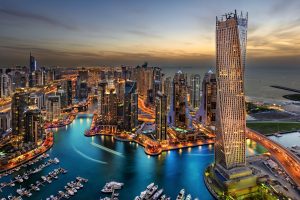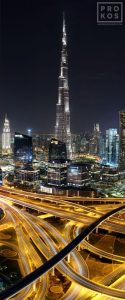Dubai, a city known for its modern architecture, towering skyscrapers, and luxurious lifestyle, has emerged as one of the most developed cities in the world.
However, beneath its glitzy exterior lies a fascinating story of how this metropolis has transformed from a barren desert landscape to a global hub of commerce, innovation, and tourism.
Dubai’s history stretches back centuries, beginning as a small fishing village situated along the shores of the Persian Gulf.
During the early years, Dubai’s economy revolved around fishing, pearl diving, and a modest trade route that connected India and the Arabian Peninsula, however, the city’s prospects began to change in the late 19th century with the discovery of oil in the region.
Dubai’s transition from a modest trading post to a globally recognized city gained momentum in the 1960s with the discovery of oil reserves.
The newfound wealth generated by the oil industry kickstarted a period of rapid development, with extensive investment in infrastructure, education, and social welfare.
Diversification Strategy, its leaders were well aware of the finite nature of their oil reserves and the need to diversify the economy.
In the 1980s, the city set forth on an ambitious plan to transform itself into a global business and tourism destination.
Strategic investments were made in sectors such as finance, real estate, logistics, and services, as well as the establishment of various economic free zones, including the world-renowned Dubai International Financial Centre (DIFC) and Jebel Ali Free Zone (JAFZA).
Dubai’s transformation would not have been possible without its audacious development projects, which captured the world’s attention.
Iconic structures like the Burj Al Arab, the world’s first construction of Jebel Ali Port, the largest man-made harbor in the world, positioned Dubai as a global trading hub.
Dubai’s emergence as a tourism hotspot has been a key driver of its development. The city’s leadership recognized the potential of tourism early on and made significant investments in infrastructure, entertainment, and hospitality.
From world-class shopping malls and theme parks to luxury resorts and cultural attractions, Dubai offers an unrivaled experience for international visitors.
Dubai’s success can also be attributed to its liberal economic policies and business-friendly environment.
With no corporate or personal income taxes, along with minimal bureaucracy, the city has attracted businesses and entrepreneurs from around the world.
The presence of a diverse multinational workforce has further fueled innovation and accelerated growth in various sectors.
Dubai’s metamorphosis from a humble desert town to a global powerhouse is nothing short of remarkable. The city’s visionary leadership, strategic investments, and a relentless pursuit of excellence have propelled Dubai to unparalleled heights.
Today, Dubai stands as a symbol of ambition, innovation, and the possibilities that can be realized when a bold vision is coupled with unwavering determination.


